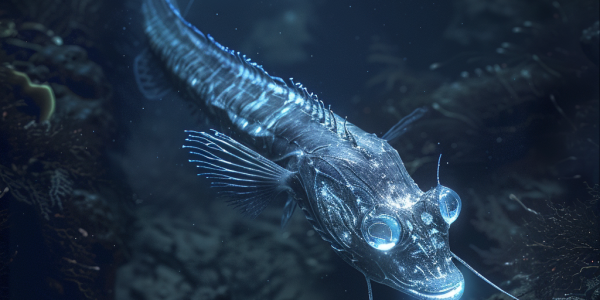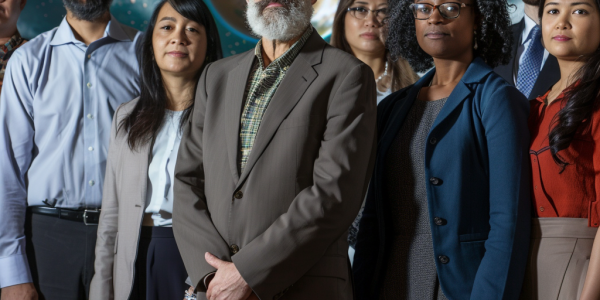New Evidence of Phosphine on Venus Sparks Life Debate
Scientists have unveiled new evidence of phosphine in Venus’ clouds, reigniting the debate about the potential for life on the planet. Recent findings presented at a Royal Astronomical Society meeting highlight advancements in observational technology, leading to more robust data supporting the initial detection of phosphine. The discovery of ammonia in the atmosphere further complicates the search for extraterrestrial life, prompting renewed interest in Venusian research and future exploration missions.
Male Dragonfishes Evolve Larger Eyes for Mate Attraction in Dark Depths
A groundbreaking study from Boston College reveals that male dragonfishes have evolved larger eyes than females to enhance mate detection in the dark depths of the ocean. This unique adaptation, highlighted in the journal Biology Letters, sheds light on sexual dimorphism and survival strategies in deep-sea ecosystems. Discover how these fierce predators navigate their challenging environment and the implications for evolutionary biology.
Revolutionizing Brain Research with 3D ‘Village in a Dish’ Organoids
Researchers have achieved a groundbreaking milestone in brain research by growing 3D models of the brain containing a diverse range of cell types from multiple individuals. These ‘village in a dish’ organoids have the potential to reveal how the brain responds to drugs among different people. The chimeric cultures, known as Chimeroids, combine cells from up to five donors and could revolutionize drug testing processes. This innovative technology offers a powerful tool for studying organ development and function, particularly in the intricate and slow-growing brain organoids.
Ray Kurzweil Predicts Significant Advancement in AI by 2045
Renowned AI scientist Ray Kurzweil shares his optimistic outlook on the future of artificial intelligence (AI), predicting a significant expansion of intelligence by 2045. With advancements in AI accelerating, Kurzweil’s earlier predictions about human-level intelligence by 2029 and the merging of humans with computers by 2045 are now viewed with more credibility. The future of AI, according to Kurzweil, is on a trajectory towards unprecedented growth, with the potential for the merging of human intellect with machine capabilities becoming a reality.
NASA Selects 12 Scientists for ESA’s Hera Mission to Study Binary Asteroid System
NASA has selected 12 participating scientists to join ESA’s Hera mission, which aims to study the binary asteroid system Didymos and its moonlet Dimorphos. The mission, scheduled to launch in 2024, seeks to validate the kinetic impact method for deflecting asteroids on potential collision courses with Earth. The collaboration between NASA and ESA will gather crucial data on the bodies’ composition and assess changes caused by the DART spacecraft’s impact.
Harvard Scientists Speculate on Hidden Civilization on Earth
Harvard scientists speculate on the existence of a hidden, technologically advanced civilization on Earth, suggesting that UFO sightings may actually be activities of intelligent beings living among us in human form. Despite skepticism, the researchers propose various possibilities, including ancient human civilizations and earthbound angels, for these cryptoterrestrials.
NIH Scientists Rake in $710 Million in Royalties from Drug Makers During Pandemic
Recent revelations from the NIH have uncovered a $710 million royalty windfall for agency scientists during the pandemic, with NIAID receiving the bulk of $690 million. Transparency advocates are pushing for details on these lucrative deals, especially regarding COVID vaccine royalties. Dr. Fauci faces scrutiny over potential conflicts of interest, underscoring the need for accountability within the NIH.
Groundbreaking Cancer Research Discovery by Late UVA Scientist John Herr
Groundbreaking cancer research has emerged from the late University of Virginia School of Medicine scientist, John Herr, regarding the SAS1B protein found in cancer cells. Collaborating with Dr. Craig L. Slingluff Jr., Herr’s work holds the promise of innovative treatments for solid cancer tumors like breast cancer, lung cancer, and melanoma. Recent scientific publications highlight the significant impact of Herr’s investigations, pointing towards potential groundbreaking advancements in cancer therapy.
Study Predicts Earth’s Future to be Uninhabitable for Mammals in 250 Million Years
A recent study published in Nature Geoscience predicts the eventual demise of mammalian life on Earth in 250 million years. Earth’s tectonic plates are projected to merge, releasing high levels of CO2 and raising temperatures to 40-50 degrees Celsius, making it impossible for terrestrial life to survive. This underscores the fragility of our planet’s ecosystem and the challenges future generations may face.
Colossal Black Hole Discovered Near Dawn of Time
Scientists have made a groundbreaking discovery by finding a colossal black hole near the dawn of time, residing in one of the earliest galaxies in the universe. The supermassive black hole, located at the core of GN-z11, sheds light on the early formation of these cosmic giants. Recent observations suggest that supermassive black holes may have their origins in the dense cores of starburst galaxies, but the exact mechanisms remain a mystery.










